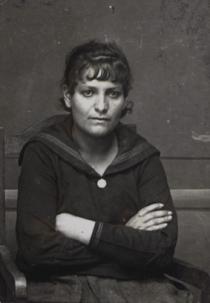Samuel Birger
This is me on my 16th birthday, Vilnius, 1947.
I went to school when I turned eight. Frankly speaking it was hard for me to study. Things teachers told were unclear to me. I was really lacking behind as compared to the others, more well-prepared students. There was nobody at home who could help me out. I did not like school and was looking forward to holidays.
Life was hard on us after the war. Father was the only bread-winner. She worked as a loader. He carried heavy rolls of paper and print samples to the publisher. In the period of 1946-47 bread and primary goods were sold by food cards. We had to stand in the line at night in order to get the products by cards- the way it was in military years. Once, our food card was stolen and we had been starving for entire week. I went to study. It was even harder for me than in pre-war period as I was an overage. In 1948 our family was stuck by a sorrow. Father's heart, being troubled by a hard physical labor, suddenly stopped. Father was buried in summer 1948 at the age of 48. It was a Jewish funeral with all Jewish rites being observed. He was carried to the cemetery on the boards and shivah was observed at home. When the mourning was over, it was decided by our family that I had to work as I was the oldest brother in the family and so-to-say the only bread-winner. I became apprentice of the printer and soon started working independently. I worked on platen, where rather high skills were required. I set printing mould, evened it and followed the quality of printing. I liked my job. Unlike my school I felt confident there. Mother also had to look for a job. She started working as a janitor in a bar by train station.
I had worked for publishers since 1951. Here in joined komsomol. In 1951 I was drafted in the army. I served in Siberian city Omsk [3500 km from Vilnius] in communications squad. First it was very complicated. It was the time of anti-Semitist campaigns, when Jews were blamed in treason and cosmopolitanism. Common soldiers were not thinking who was right or wrong and I personally felt what anti-Semitism was about. There were cases when I was rudely called 'zhyd' [kike]. Clever people helped me out. Headquarters commander of our regiment and political officers were Jews. They involved me in komsomol work. I was assigned secretary of komsomol organization of the battalion and it was a rather important position. Since that time all cavils regarding my nationality stopped. My patrons - headquarters commander and political officer suggested that I should join Communist Party. They sent me to the party school of the division. Upon finishing it I became the candidate to the Communist Party. I had a lot of work to do- I was in charge of the paper, had discussions with the soldiers about politics of the party and Soviet government. I was promoted in rank. In 1954 I was demobilized from the army as a first class private.
In Vilnius I found a job rather quickly as I was the candidate to KPSS which was rare in Lithuania. I was hired as a locksmith -assembler by electric welding equipment plant. I did very well. I was raised in my class and made pretty good money. When mother turned 55 I insisted on her retirement. I was admitted to the communist party and again I was offered social work. Soon I became the party officer of the second workshop, where welding machines were produced.



















